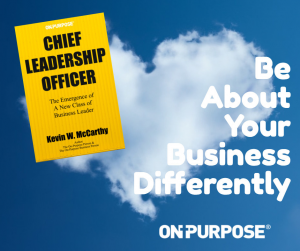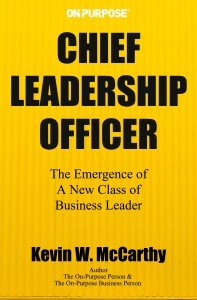In Chief Leadership Officer, you’ll be introduced to “The Complete Competence Model” which is the next generation of “The 3 Views of People” model shared in this On-Purpose Business Minute.

How Is Your View of People?
Your response reveals your preferred place for leading. It tends to reveal how you view others as being competent. Until we learn otherwise, many who lead teams will project their preferred perspective onto others. It is a subtle form of, Why can’t they be more like me? Setting yourself as the standard sets everyone else up to fail which undermines the business performance.
Each person is unique and can bring a measure of unique contribution to even the most routine of work.
For example, On-Purpose Partners ships books and products from the Winter Park, FL Post Office branch. At the counter is a postal clerk named James. He resembles the comedian Joe Piscopo. James is literally a stand-up clerk offering ongoing entertaining commentary and laughter all day long. He brings out the best in his peer counter clerks as the banter between them all keeps things moving along. By the way, when the other clerks have a problem it is James they turn to. He knows his post office stuff. Many a postmaster might try to make James conform to a more “professional” decorum. Instead, he makes the wait tolerable and the service more than acceptable.
There are 3 Views of People:
- Expert — aspires to technical proficiency and sees the world through tasks to be done
- Manager — organizes teams of people and sees the world through projects
- Leader — sets culture and sees the world through results
Purpose informs all three points of view. This is one of the many reasons why The On-Purpose Principle is the essential basis for unifying people.
Few of us fully reside in a single view. Rather we’re a blend of all. Knowing your dominant preference, however, provides insights to job satisfaction, performance, and even future advancement.
This speaks to the nature of fit. As a business advisor for over 3 decades, I’ve come across all kinds of challenges in organizations. One of the best disguised is this problem of poor fit between a person’s view of people and their role and responsibilities on the job. It is an often overlooked dimension that can create disasters or delights.
Years ago when I worked at a company, I was part of the hiring process for a property manager. When I asked this woman what she thought was her weakness she bluntly stated, “I don’t like people.” I shared my concerns with the hiring manager who hired her anyway. She was a good property manager (technical), but wreaked havoc in the office relationships and with tenants (manager). She so fouled the workplace that no one wanted to work with or for her (leadership). Even vendors complained.
The Complete Competency Model isn’t just a makeover of the Peter Principle which states that people eventually rise to their highest level of incompetency. People view may be one of the underlying causes of poor job performance and fit.
When there’s good alignment or fit between the person and the work, people view melts away and can often be taken for granted. Like good health, when we have it we’re prone to forget about it. But once we’re sick or injured we so appreciate what we used to have.
After watching this On-Purpose Business Minute, assess your people view with your job fit. What you discover about yourself could be very enlightening and rewarding to your long-term health, job satisfaction, and earning capacity. Coming to terms with this, however, may be another matter all together.
Having worked with business leaders and CEOs over my career, I’ve seen firsthand the price that is paid by a person and an organization when there is a clash of people view and the requirements of a job. Because my work is most often in the C-Suite, I’m especially alarmed when I find a “leader” who is really put off or bothered by people. They may be respected experts in their field, but they have little to no aptitude for leading and managing. That’s fine, but why have them lead? (When I raise this matter, it often gets tenderly complicated for me, the business advisor, when the misfit is the managing director, owner, or CEO of the enterprise. In some cases, however, this brings a sense of relief for the person because they better understand who they are and we can develop a plan of improvement or a workaround.)
On the other hand, the best leaders love and care for people, are effective at managing, and have mastered tasks sufficiently to have paid their dues and risen through the ranks to have the respect of their reports. Ultimately, it is their people skills that create the separation from good to great leadership.
True leaders are culture creators by design, not by default. Typically, they’re not the go-to expert in various fields, disciplines, or technologies. Their currency comes in denominations of their presence, decisions, manner, and tone. They get people working together. Leaders press the flesh and are visible. This isn’t out of ceremonial duty, but from a genuine love and respect for the people who follow their lead. Leaders are often reflective and thoughtful, and they know how to set healthy boundaries to avoid burnout and bitterness for others and themselves.

Do yourself a favor and take today’s message to heart. Where are you? Where would you like to be? If you need help creating your culture so it is on-purpose, then email us to consider some On-Purpose Executive or Personal Coaching.

